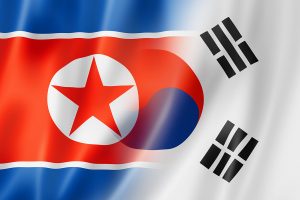Are there Korean dialects? One of the questions we most commonly get asked on tour is if North and South Korea speak the same language. The quick and simple answer is of course yes, but after 70-plus years as a divided nation there are indeed a few caveats that are worth exploring. But it does not just stop there either, even before the division of the country there were different Korean dialects. Here’s our in=depth guide to the dialects of Korea.

The Korean language
The source of the Korean language is a hotly contested one, with there being numerous differing theories and opinions. One of the most popular ones is that Korean is not linked to any other language family, and is instead one of the world’s very few “language isolates”, sharing said distinction with languages such as Basque, Finnish and Ainu. Although up to 70 percent of the Korean vocabulary is of Chinese origin, the syntax and grammar bear more similarity to Japanese.
Korean Dialects – The North-South divide
Although both North and South Korea have their own regional dialects, the two main dialects have their roots in the division of the Korean peninsula. In the South standard Korean is based in the Seoul dialect, and in the North standard Korean is based on – you guessed it –the Pyongyang dialect.
The differences between northern and southern Korean warrant their own blog, but generally speaking the northern dialect tends to be much politer, lacking in Western/English loan words, and much more likely to have linguistically ‘pure’ Korean words for things.
Regional Korean dialects
- Hamgyong dialect (similar to what is spoken by Koreans in China)
- Pyongyang Dialect (the official standard Korean as spoken in Pyongyang)
- Central dialects (including the Seoul dialect – the official standard Korean in the South)
- Gangwon dialects (spoken in the border areas of the ROK and DPRK)
- Gyeongsang dialects (spoken in the south of South Korea with a more varied pitch)
- Jeola dialect (spoken in the south-west of South Korea)
Does Jeju have a dialect or its own language?
There’s a famous quote that says a language is a dialect with an army (I’m looking at you, former Yugoslavia), so Jeju is a funny one. Most people on Jeju island now speak standard Korean, but an older generation maybe numbering less than 10,000 speak the Jeju “language”, almost unintelligible from standard Korean, although it is still belongs to the same Korean language family. Therefore it is s athin line whether it is its own language, or indeed a Korean dialect.
Outside of the Korean Peninsula
Koryo-mar – a descendent of the Hamgyong dialect spoken by the Koryo-saram group of ethnic Koreans that live in parts of the former Soviet Union.
Zainichi Korean Language – Spoken by members of the Korean community of Japan, and unsurprisingly incorporating a number of loan words from Japanese.
Korean language in China – The dialect is almost identical with that of Hamgyong, but with instances of loan words from Chinese.
Can I learn the North Korean dialect?
Obviously the easiest way to learn Korean is to learn the Korean of the south, although it is possible to learn the Northern Dialect of Korean in both Yanji, as well as in Pyongyang. We have also explored learning Korean in Rason, the main SEZ of North Korea.
You can read about the Rason SEZ here.
Alteratively we run a once a year month long tour at one of the leading universities in Pyongyang. This is not a tour, this is full on eating, sleeping and breathing Pyongyang life.
If you’d like to learn the Pyongyang dialect then join us on our study tour to Pyongyang this summer.





